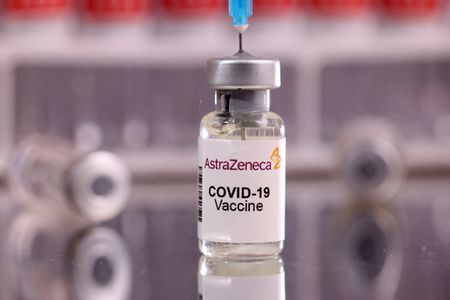 1
1 1
1

By Maggie Fick
BARCELONA (Reuters) – AstraZeneca is confident that its new version of COVID-19 antibody treatment could protect immunocompromised patients against all known virus variants, its vaccines head said.
Laboratory studies show the antibody, called AZD3152, neutralizes all known variants of COVID-19 and AstraZeneca has support from regulators to make the treatment available by the end of this year, Iskra Reic said in an interview on Tuesday.
AstraZeneca plans, pending more positive data and regulatory approval, to make the antibody available by the end of 2023.
These types of therapies are most needed for people with compromised immune systems, either because of underlying conditions or because they are undergoing immune suppressing treatments. They account for nearly 2% of the global population.
In January, the U.S. health regulator withdrew its emergency use authorization for AstraZeneca’s original COVID-19 antibody cocktail Evusheld, as new dominant variants made it obsolete.
The U.S. Food and Drug Administration’s (FDA) decision resonated with concerns raised by Europe’s health regulator.
AstraZeneca’s AZD3152, it new COVID-19 antibody, was acquired through a $157 million deal last year with British biotech start-up RQ Bio.
The British drugmaker will likely make future investments like its current partnerships with RQ Bio but did not have any deals to announce, said Reic, a longtime AstraZeneca executive who has led the company’s vaccines and immune therapies unit since it was formed in late 2021, during the pandemic.
Last year, the unit made $4.8 billion in revenues. However, demand for COVID-19 vaccines have dramatically declined with competition from mRNA vaccines and given many countries already have an oversupply of COVID-19 shots.
(Reporting by Maggie Fick in Barcelona; Additional reporting by Natalie Grover in London; Editing by Alexander Smith)